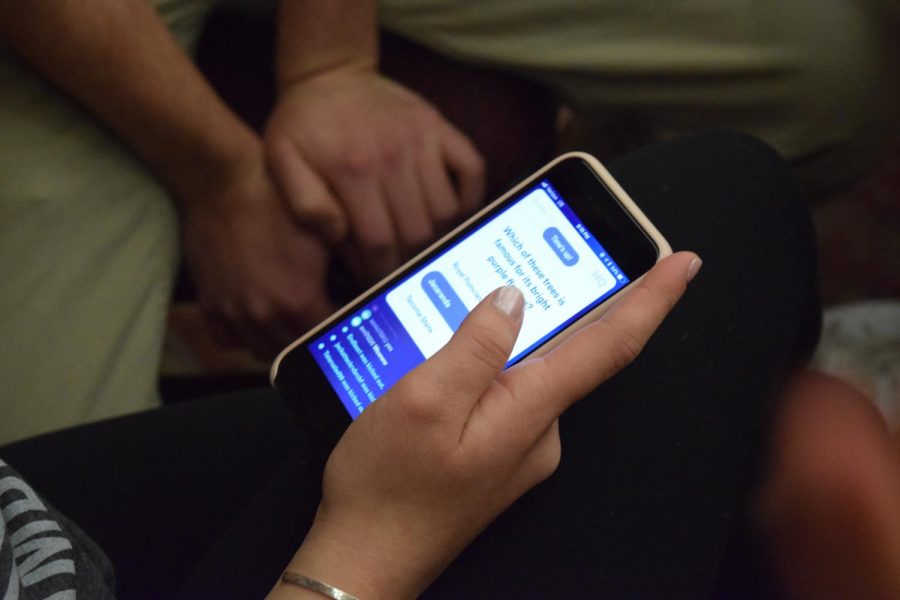Trivia leads to teacher frustration
HQ increases cell phone use, creates distraction
Photo Illustration by Yonah Davis
Photo Illustration by Yonah Davis
January 18, 2018
As senior Elliot Schochet approached the final HQ question, his excitement grew knowing a cash prize was on the line.
“Last week, me and a bunch of friends were playing together, and we got to question 12, and it was super stressful. Every question the suspense kept building,” Schochet said. “We didn’t know (question 12) and we got it wrong, and we’re all pretty upset.”
According to junior Daniel Hunegs, HQ is a 12-question live trivia game show occurring twice a day where players have the opportunity to win money. Hunegs said if players miss a question, they are eliminated from the game.
Math teacher Anson Opara said several students play HQ in his sixth hour class.
“It’s distracting because there’s a game at 2 p.m. so a lot of kids won’t pay attention to what’s going on in class. They try to hide the game, and they want to keep playing, which is frustrating because I teach AP Stats, and it’s a hard class,” Opara said. “It’s one of many, many, many distractions that’s new to school.”
According to science teacher Kristen Moravetz, phones can pose as a significant distraction in class.
“I could come up with the most engaging lesson plan possible, but there would still be somebody who’s going to choose to be on Netflix, be on Facebook, do whatever else,” Moravetz said.
Moravetz said she believes cell phones can be addictive.
“I think that technology addiction is a real thing, and I think there are literally people that can’t focus if they haven’t seen their phone in the last five minutes,” Moravetz said.
According to CNN, nomophobia, short for “no mobile phone phobia,” refers to the fear of being unable to use your cell phone or other smart device.
In a 2016 survey from Common Sense Media, 50 percent of teens reported feeling addicted to their mobile devices and 78 percent of teens reported checking their devices at least hourly.
Freshman Isaac Scott said he notices his peers playing HQ no matter if the teacher allows them to or not.
“Even if the teachers don’t want them to, kids will just go and play it,” Scott said. “Most of the time teachers are okay with it, but the kids will just get up together and start going on their phones.”
Schochet said because HQ contains the opportunity to win money, it has become increasingly popular.
“I think there’s a mixture of that it’s fun, but also the chance to win money is always exciting,” Schochet said. “There’s also a little part of you that knows you’re never actually going to win, but it’s still very much like a thrill-seeking type of thing.”
Moravetz said she allows students to play HQ on some workdays.
“If it’s a workday and people have been working hard it can be a fun way to kind of let loose there can be a collaborative aspect when more people are playing and can increase your odds,” Moravetz said. “However, that is possibly setting a bad precedent for when there’s a time where we are reviewing something that’s really important.”
Schochet said he notices HQ becoming a distraction throughout the school as the game grows in popularity.
“It’s pretty bad. None of us pay attention and our teacher gets really upset about it. I know it’s kind of spread and become a real issue,” Schochet said.
Moravetz said phones have been a distraction in the past, but she has seen a recent increase in classroom use.
“I’m not going to blame HQ for phones being a problem because phones have been a problem in my class since I started,” Moravetz said. “I think it has gotten worse over the last couple of years in general.”
Opara said although he understands why students play HQ during the school day, he feels they should prioritize learning first.
“I would say figure out what’s more important. Is risking a chance to win 2,000 dollars that’s probably not going to happen, is that worth the risk doing it daily versus like getting like an F or a D?” Opara said.






